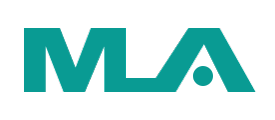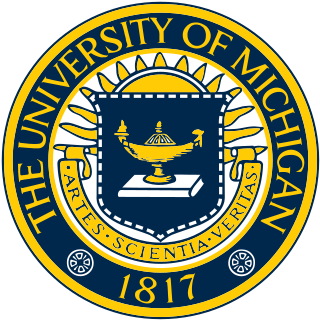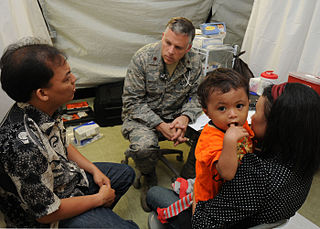Related Research Articles

Tufts University is a private research university on the border of Medford and Somerville, Massachusetts. It was founded in 1852 as Tufts College by Christian universalists who sought to provide a nonsectarian institution of higher learning. Tufts remained a small New England liberal arts college until the 1970s, when it transformed into a large research university offering several doctorates; it is classified as a "Research I university", denoting the highest level of research activity. Tufts is a member of the Association of American Universities, a selective group of 64 leading research universities in North America. The university is known for its internationalism, study abroad programs, and promoting active citizenship and public service across all disciplines.
The National Academy of Medicine (NAM), formerly called the Institute of Medicine (IoM) until 2015, is an American nonprofit, non-governmental organization. The National Academy of Medicine is a part of the National Academies of Sciences, Engineering, and Medicine, along with the National Academy of Sciences (NAS), National Academy of Engineering (NAE), and the National Research Council (NRC).
MedlinePlus is an online information service produced by the United States National Library of Medicine. The service provides curated consumer health information in English and Spanish with select content in additional languages. The site brings together information from the National Library of Medicine (NLM), the National Institutes of Health (NIH), other U.S. government agencies, and health-related organizations. There is also a site optimized for display on mobile devices, in both English and Spanish. In 2015, about 400 million people from around the world used MedlinePlus. The service is funded by the NLM and is free to users.
The United States National Agricultural Library (NAL) is one of the world's largest agricultural research libraries, and serves as a national library of the United States and as the library of the United States Department of Agriculture. Located in Beltsville, Maryland, it is one of five national libraries of the United States. It is also the coordinator for the Agriculture Network Information Center (AgNIC), a national network of state land-grant institutions and coordinator for the U.S. Department of Agriculture (USDA) field libraries.

The Medical Library Association (MLA) is a nonprofit, educational organization with more than 3,400 health sciences information professional members and partners worldwide.
The Internet Public Library was a non-profit, largely student-run website managed by a consortium, headed by Drexel University. Visitors could ask reference questions, and volunteer librarians and graduate students in library and information science formed collections and answered questions. The IPL opened on March 17, 1995. On January 1, 2010 it merged with the Librarians' Internet Index to become ipl2. It ceased operations completely on June 30, 2015.

Mahidol University (Mahidol), an autonomous research institution in Thailand, had its origin in the establishment of Siriraj Hospital in 1888. Mahidol had an acceptance rate for Medicine of 0.4% as of the 2016 academic year. Becoming the University of Medical Science in 1943, it has been recognized as the country's fourth public university. The university was later renamed in 1969 by King Bhumibol Adulyadej after his father, Prince Mahidol of Songkhla, the "Father of Modern Medicine and Public Health of Thailand". The university originally focused on health sciences but expanded to other fields in recent decades. It hosted Thailand's first medical school, the Siriraj Medical School. Today, Mahidol offers a range of graduate and undergraduate programs from natural sciences to liberal arts with remote campuses in Kanchanaburi, Nakhon Sawan, and Amnat Charoen provinces. There are a total of 629 programs offered from 17 faculties, 6 colleges, 9 research institutions and 6 campuses. In terms of fiscal budget and portion of budget spent on research programs, the university receives the highest budget of any public university in Thailand: $430 million in 2019, most of which is granted for graduate research programs. Mahidol University was ranked Thailand's #1 university in 2011 by QS Asian University Rankings.

The University of Michigan Library is the academic library system of the University of Michigan and the second largest research library in the United States by volumes held.

A health or medical library is designed to assist physicians, health professionals, students, patients, consumers, medical researchers, and information specialists in finding health and scientific information to improve, update, assess, or evaluate health care. Medical libraries are typically found in hospitals, medical schools, private industry, and in medical or health associations. A typical health or medical library has access to MEDLINE, a range of electronic resources, print and digital journal collections, and print reference books. The influence of open access (OA) and free searching via Google and PubMed has a major impact on the way medical libraries operate.
Tufts University School of Dental Medicine (TUSDM) is a private, American dental school located in the Chinatown neighborhood of Boston, Massachusetts, and is connected to Tufts Medical Center. It is one of the 8 graduate schools that comprise Tufts University. Founded in 1868 as Boston Dental College by Dr. Isaac J. Wetherbee, the university is the second oldest dental school in the city, and one of the oldest in the country.
The Master of Library and Information Science (MLIS), also referred to as the Master of Library and Information Studies, is the master's degree that is required for most professional librarian positions in the United States. The MLIS is a relatively recent degree; an older and still common degree designation for librarians to acquire is the Master of Library Science (MLS), or Master of Science in Library Science (MSLS) degree. According to the American Library Association (ALA), "The master’s degree in library and information studies is frequently referred to as the MLS; however, ALA-accredited degrees have various names such as Master of Information Studies, Master of Arts, Master of Librarianship, Master of Library and Information Studies, or Master of Science. The degree name is determined by the program. The [ALA] Committee for Accreditation evaluates programs based on their adherence to the Standards for Accreditation of Master's Programs in Library and Information Studies, not based on the name of the degree."

Health literacy is the ability to obtain, read, understand, and use healthcare information in order to make appropriate health decisions and follow instructions for treatment. There are multiple definitions of health literacy, in part, because health literacy involves both the context in which health literacy demands are made and the skills that people bring to that situation.
Overview

A special library is a library that provides specialized information resources on a particular subject, serves a specialized and limited clientele, and delivers specialized services to that clientele. Special libraries include corporate libraries, government libraries, law libraries, medical libraries, museum libraries, news libraries. Special libraries also exist within academic institutions. These libraries are included as special libraries because they are often funded separately from the rest of the university and they serve a targeted group of users.
The Tufts OpenCourseWare (OCW) project, was a web-based publication of educational material from a number of Tufts University courses, providing open sharing of free, searchable, high-quality course content to educators, students, and self-learners throughout the global community. The Tufts OCW initiative encouraged the publication and free exchange of course materials on the World Wide Web. First launched in June 2005, Tufts OCW provided materials with strong representation from Tufts' health sciences schools, some of which were equivalent to textbooks in depth. All materials on the Tufts OCW site were accessible and free of charge. As Tufts OCW is not a distance learning program, no registration, applications, prerequisites, or fees are required and no credit is granted. Tufts ended funding for its Open Courseware initiative in 2014, and content on the Tufts OCW web site was removed on June 30, 2018.
Health Sciences Online (HSO) is a non-profit online health information resource that launched in December 2008. The website hosts a virtual learning center providing weblinks to a collection of more than 50,000 courses, references, textbooks, guidelines, lectures, presentations, cases, articles, images and videos, available in 42 different languages. The content includes medicine, public health, nursing, pharmacy, dentistry, nutrition, kinesiology and other health sciences resources.
Health communication is the study and practice of communicating promotional health information, such as in public health campaigns, health education, and between doctor and patient. The purpose of disseminating health information is to influence personal health choices by improving health literacy. Health communication is a unique niche in healthcare that allows professionals to use communication strategies to inform and influence decisions and actions of the public to improve health.

Cultural competence in healthcare refers to the ability for healthcare professionals to demonstrate cultural competence toward patients with diverse values, beliefs, and feelings. This process includes consideration of the individual social, cultural, and psychological needs of patients for effective cross-cultural communication with their health care providers. The goal of cultural competence in health care is to reduce health disparities and to provide optimal care to patients regardless of their race, gender, ethnic background, native languages spoken, and religious or cultural beliefs. Cultural competency training is important in health care fields where human interaction is common, including medicine, nursing, allied health, mental health, social work, pharmacy, oral health, and public health fields.
The library system of Tufts University covers all academic departments comprising the university. The main library is Tisch Library which holds about 2.5 million volumes, with other holdings dispersed at subject libraries.
References
- ↑ US Census Bureau, A. S. D. "Census 2000 Gateway - U.S. Census Bureau". www.census.gov. Retrieved 2020-02-18.
- ↑ "Welcome to Selected Patient Information Resources in Asian Languages (SPIRAL)". spiral.tufts.edu. Retrieved 10 June 2020.
- ↑ Health Libraries Group Newsletter. Volume 25, Number 2, June 2008.
- ↑ "Found in Translation". Tufts University. November 13, 2006
- ↑ Meeting Symposium, "Serving Diverse Users: Cultural Competencies for Health Sciences Librarians". Medical Library Association 2006 - Phoenix, AZ, May 24, 2006.
- ↑ "SPIRAL: Selected Patient Information Resources in Asian Languages" [Poster]. National Leadership Summit on Eliminating Racial and Ethnic Disparities in Health, sponsored by the United States Department of Health and Human Services Office on Disability in partnership with the Office on Women's Health and the Office of Minority Health - Washington, D.C., January 9–11, 2006.
- ↑ "SPIRAL: Selected Patient Information Resources in Asian Languages" [Poster]. Medical Library Association Annual Meeting 2005 - San Antonio, TX, May 14–19, 2005
- ↑ "The Export Of Boston Science and Medicine." The Boston Globe. April 12, 2005, Third Edition:C2.